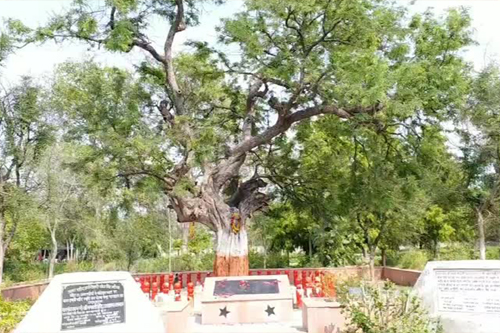BAWAN IMLI MEMORIAL

The Bawan Imli Memorial marks one of the most tragic yet inspiring chapters of India’s freedom struggle. This memorial stands as a tribute to the 52 revolutionaries who the British hung on April 28, 1858. The event remains a powerful reminder of the courage and sacrifices of those who fought for India’s independence.
April 28, 1858: A Day of Sacrifice
During the Revolt of 1857, a wave of rebellion swept across India. This uprising wasn’t limited to soldiers but also involved farmers, merchants, and common people who stood united against British rule. The revolution shook the foundation of British imperialism, and they resorted to brutal measures to suppress the movement.
In the Fatehpur district, near Khajuha in the Bindki subdivision, British forces captured 52 freedom fighters. These revolutionaries were accused of rebellion against the colonial government. Without a fair trial, they were sentenced to death.
On April 28, 1858, the British hanged all 52 revolutionaries on a tamarind tree at the site. This massacre was not just an act of cruelty but a stark symbol of the clash between colonial oppression and the undying spirit of India’s freedom fighters.
The Tamarind Tree: A Silent Witness
The tamarind tree on which these 52 freedom fighters were executed still stands near Khajuha. This tree has become a silent witness to the tragic events of that day. Locals believe that the tree stopped growing after the massacre, a phenomenon they see as a divine mark of the site’s sanctity and historical significance.
This tamarind tree serves not only as a reminder of the sacrifices of those brave revolutionaries but also as a living symbol of their struggle for freedom.
The Importance of Bawan Imli Memorial
The Bawan Imli Memorial is more than just a historical site; it is a testament to the spirit of India’s freedom movement and the sacrifices of its martyrs. The site pays homage to those who gave their lives to keep the dream of an independent India alive.
This memorial reminds us that the freedom struggle was not merely a physical battle but also a moral and ideological conflict. It inspires us to remain vigilant in protecting the rights and liberties achieved through such immense sacrifices.
Significance in Local History and Culture
The Bawan Imli Memorial holds deep significance in the lives of local residents. Located near Khajuha, this site is considered sacred by the people. Every year, thousands of visitors come to pay their respects to the martyrs.
This site has become an integral part of the region’s history and culture. The stories and legends associated with it offer a deeper understanding of its historical and emotional importance.
Tourism and Preservation
Today, the Bawan Imli Memorial is a prominent tourist destination. It attracts visitors not only from nearby areas but also from across the country. Efforts by the Archaeological Survey of India and local authorities are focused on preserving the site and maintaining its historical importance.
Visitors can learn about the events of April 28 and reflect on the sacrifices made for India’s independence. The site offers various amenities for tourists to ensure they can fully experience this chapter of history.
Legends and Beliefs
Several myths and beliefs are associated with the tamarind tree. Locals believe that the spirits of the 52 martyrs still reside in the tree, keeping their sacrifice alive in memory.
It is also said that the tree’s halted growth is a divine sign, further solidifying its place as a historic and spiritual symbol.
Bawan Imli in Contemporary Context
Today, the Bawan Imli Memorial is not just a reminder of a historical event but also a source of inspiration for the present and future. It serves as a constant reminder that the sacrifices made for freedom should never be forgotten, and the values of independence should always be cherished.
Conclusion
The Bawan Imli Memorial is a symbol of sacrifice, freedom, and courage. It stands as a tribute to the countless revolutionaries who laid down their lives for the country.
As we live in a free nation today, it is our duty to remember their sacrifices and pass on the stories of their bravery to future generations. The Bawan Imli Memorial is not just a historical landmark but also a representation of the ideals and values of India’s freedom struggle.
